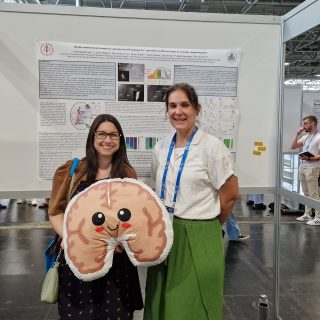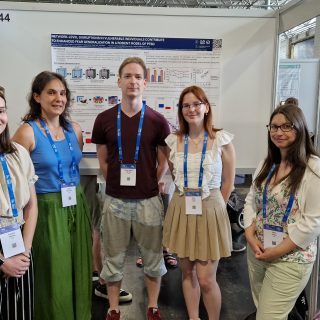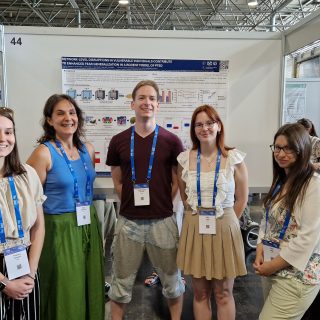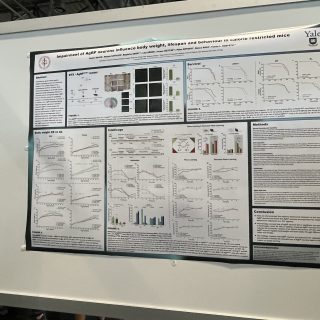Researchers from the University of Veterinary Medicine Budapest presented their work at another prestigious international conference. FENS (Federation of European Neuroscience Societies) is one of Europe’s most significant international neuroscience conferences, organizing the FENS Forum biennially, attracting nearly 7,000 participants. This year’s conference, held in Vienna, aimed to provide researchers from all fields of neuroscience the opportunity to share their latest findings and methods with the scientific community. The conference program covers a wide spectrum of neuroscience, allowing attendees to participate in presentations and other activities related to their research.
This year, students and staff from the University of Veterinary Medicine Budapest showcased their work: Master’s student in biology, Róbert Dániel Maróthy, Bachelor’s student in biology, Réka Katalin Kispál, along with their collaborative work with second-year biology student Fruzsina Fazekas, Dr. Eszter Berekméri, research associate at the Department of Zoology, Dr. Gina Puska, adjunct professor in the Department of Zoology, and third-year veterinary student Eszter Balkó with her supervisor, Dr. Bence Rácz, deputy head of the Department of Anatomy and Histology, presented their results.
Róbert Dániel Maróthy conducts his research at the Translational Behavioral Neuroscience Research Group of the HUN-REN Institute of Experimental Medicine. He examined the mechanisms underlying vulnerability in an animal model of a psychiatric disorder, post-traumatic stress disorder (PTSD). By mapping full brain activity in trauma-like situations, he compared the differences in brain networks between animals exhibiting PTSD-like symptoms (vulnerable) and those that did not (resilient). His findings included not only differences in brain regions with previously described activity in the literature but also areas not yet associated with PTSD, as well as differences in brain network connectivity between the two groups. His results may contribute not only to understanding the mechanisms underlying the disorder but also to developing more effective therapeutic interventions in the future.
Another participant, Réka Katalin Kispál, investigated the relationship between reward prediction error (the difference between received and expected rewards) and the release of neuromodulators (dopamine, acetylcholine, norepinephrine, serotonin) in mice during Pavlovian conditioning. Her results are essential for understanding the development of dementias associated with neurodegenerative diseases, which are a significant issue in our ageing society, as the mechanisms they studied may also be impaired in these conditions.
Fruzsina Fazekas is researching the physiology and pathophysiology of hearing, specifically mapping the Ca2+ dynamics of the Deiters’ cells in the inner ear, considering the frequency map characteristic of the auditory organ. Her supervisor, Dr. Eszter Berekméri from the Department of Zoology, is working on the curability of hearing impairments. This year, Dr. Berekméri’s poster focused on examining the differences between cell types, while Fruzsina studied the location of one such cell (the Deiters’ cell) within the organ. Their goal is to describe cell function not only through an experimentally challenging approach but also with computer models, thus allowing for more accessible, energy- and cost-effective studies, while reducing the number of animal experiments to understand and support the functioning of the organ.
Dr. Gina Puska, another colleague from the Department of Zoology, is investigating brain regions involved in the formation of social behaviours in rodents. Social behaviours include cooperative social interactions between adult individuals, aggressive behaviour, and a specific behaviour crucial to us all, parental care. In her research, she identified and characterized a brain pathway involved in the regulation of maternal care. Understanding these brain pathways is essential for uncovering the pathological neural mechanisms underlying postpartum depression, a condition increasingly common today. Gina conducts her experiments in collaboration with the Molecular and Systems Neurobiology Research Group at Eötvös Loránd University.
Eszter Balkó and her supervisor, Dr. Bence Rácz, are researching important new insights into understanding the relationship between nutrition and healthy ageing, as well as uncovering the underlying mechanisms of various eating disorders. AgRP neurons located in the hypothalamus play a key role in the development of hunger, the regulation of the body’s energy balance, and the coordination of the appropriate behavioural response to a negative energy balance. Many studies have shown that caloric restriction can be successfully used to slow ageing processes, increasing lifespan and the time spent in good health—however, the underlying mechanisms remain unclear. In their research, they examined a transgenic mouse model with reduced AgRP neuron numbers from birth under both ad libitum (unlimited) and calorie-restricted diets. Their experiments tested the hypothesis that AgRP neurons responsible for hunger are essential for the beneficial physiological and life-extending effects of caloric restriction. Their presented results indicate a previously unknown sex-specific role for AgRP neurons in regulating body weight gain and exploratory behaviour in animals.
The University of Veterinary Medicine Budapest is proud of its young researchers’ achievements and supports its students in pursuing a scientific career.




